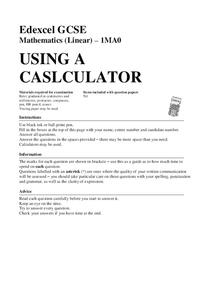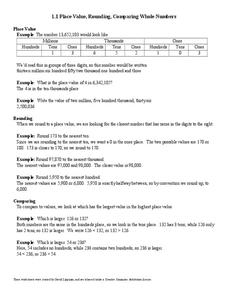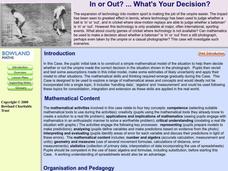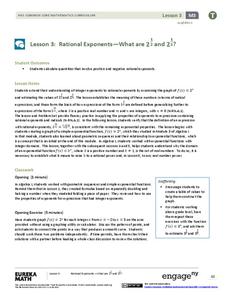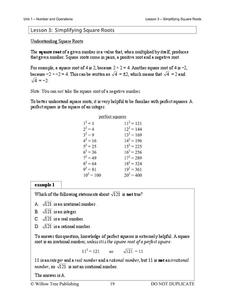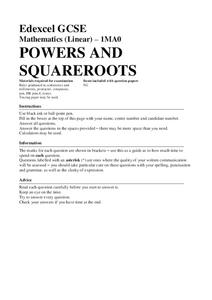Mathed Up!
Using a Calculator
Here's a video that presents several numerical expressions to be evaluated using a calculator.Viewers come to realize that sometimes it is not just a matter of punching in the numbers, but they also need to be concerned about how the...
EngageNY
Comparing Irrational Numbers
Build on your classes' understanding of irrational numbers by comparing their values. The 13th lesson in the 25-part module has individuals estimate values of both perfect and non-perfect roots. They finish by graphing these numbers on a...
EngageNY
The Decimal Expansion of Some Irrational Numbers
Develop a definition of irrational numbers through an exploration of square roots. The 11th instructional activity in this series of 25 asks scholars to estimate the value of a square root. Learners observe as the estimation extends...
EngageNY
Solving Equations with Radicals
Show learners how to develop a procedure for solving equations using radicals with the fifth instructional activity of the 25-part module that challenges learners to use properties to solve multi-step quadratic and cubic equations....
EngageNY
Simplifying Square Roots
Explore the process of simplifying square roots through an analysis of perfect squares. The fourth lesson of 25 expects individuals to find the perfect square factors in each radicand as a means of simplifying. The perfect square factor...
EngageNY
Existence and Uniqueness of Square Roots and Cube Roots
Teach cube roots by building on an understanding of square roots. The third installment of a 25-part series asks learners to solve simple quadratic and cubic equations using roots. Scholars compare square roots and cube roots throughout...
EngageNY
Square Roots
Investigate the relationship between irrational roots and a number line with a resource that asks learners to put together a number line using radical intervals rather than integers. A great progression, they build on their understanding...
EngageNY
The Pythagorean Theorem
Class members explore the estimation of irrational numbers in association with the Pythagorean Theorem. The first lesson of this module challenges pupils to use the Pythagorean Theorem to find unknown side lengths. When the length is not...
EngageNY
Proof of the Pythagorean Theorem
What does similarity have to do with the Pythagorean Theorem? The activity steps through the proof of the Pythagorean Theorem by using similar triangles. Next, the teacher leads a discussion of the proof and follows it by an animated...
Open Text Book Store
Arithmetic for College Students: Worksheets
Loaded with concepts ranging from multiplying decimals to converting units to solving problems using the order of operations, a thorough practice packet is perfect for a fifth or sixth grade math classroom.
Bowland
In or Out? ... What's Your Decision?
Young mathematicians use photos and video clips to determine if a cricket player is "in" or "out." This analysis occurs using scale factors, distance-rate-time formula, and consideration of precision and accuracy.
EngageNY
Rational Exponents—What are 2^1/2 and 2^1/3?
Are you rooting for your high schoolers to learn about rational exponents? In the third installment of a 35-part module, pupils first learn the meaning of 2^(1/n) by estimating values on the graph of y = 2^x and by using algebraic...
West Contra Costa Unified School District
Square and Square Roots
Root for your pupils to learn about roots. Young mathematicians first review the meaning of squares and square roots. They then use this knowledge to simplify square roots of monomials with variables.
EngageNY
A Focus on Square Roots
Pupils learn to solve square root equations and rationalize denominators. Problems include those with extraneous solutions.
Mathed Up!
Estimation
Reinforce estimation and the four operations—addition, subtraction, multiplication, and division—with eight page, 15 problem independent practice exercise.
Mathed Up!
Powers, Roots, and BIDMAS
Reinforce math skills with an eight-page exercise that stretches scholars' computation muscles through 13 order of operation problems.
Mathed Up!
Factors, Multiples, and Primes
Reinforce the concept of factors, multiples, and prime numbers with a 16-problem practice instructional activity. Eight pages offer a variety of problem solving opportunities with clear objectives and tips for successful completion.
University of Utah
Integer Exponents, Scientific Notation and Volume
A one-stop resource for exponents, square and cube roots, scientific notation, and volume formulas guides learners through properties of exponents. As they learn to apply these properties to operations with scientific notation,...
University of Utah
Rational and Irrational Numbers
Conquer any irrational fears you might have of irrational numbers. As class members investigate how to represent numbers geometrically, they learn about rational and irrational numbers, including approximating and ordering rational...
Willow Tree
Simplifying Square Roots
The square root of five and five do not have the same value! How many times have you addressed this with math classes? A instructional activity gives an explanation of a square root and gives examples for simplifying square root...
Mathed Up!
Powers and Square Roots
Square root and exponential powers are the focus of the assessment worksheets included in a math resource. Young mathematicians answer 10 questions, each with subset questions, involving solving a variety of exponential equations and...
Charleston School District
Review Unit 5: Equations
It's time for them to show you what they've learned! The review provides a sampling of the different concepts learned throughout the eight-part series. Learners solve equations by combining like terms, applying the distributive property,...
Charleston School District
Solving Exponent Equations
Show your class that not all equations are linear. The lesson asks learners to solve simple quadratic and cubic equations using square and cube roots. Problems include equations with no solutions.
Math Guy
Algebra 2 Practice Final
Work out to Algebra II with the 50-question instructional activity that practices different types of functions. Multiple choice questions focus on topics such as rational, radical, and logarithmic functions. The resource comes with a...


